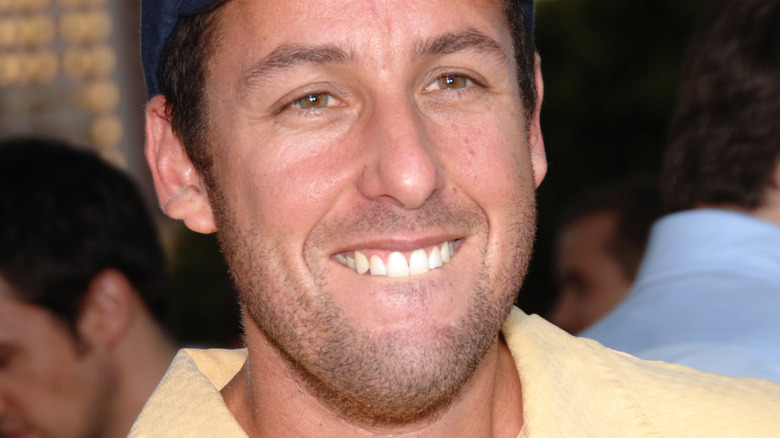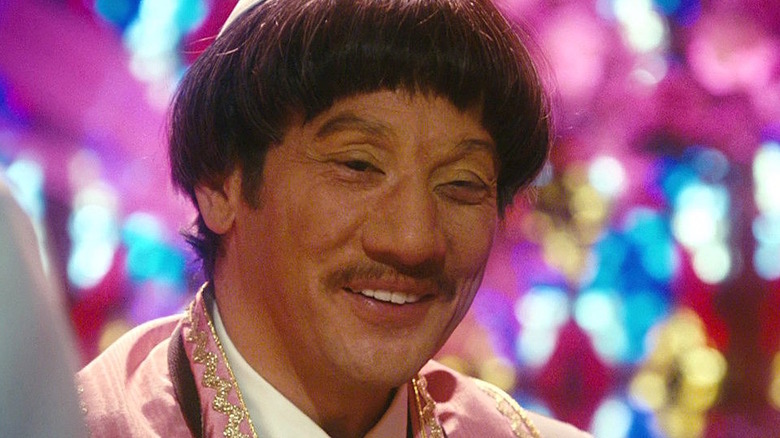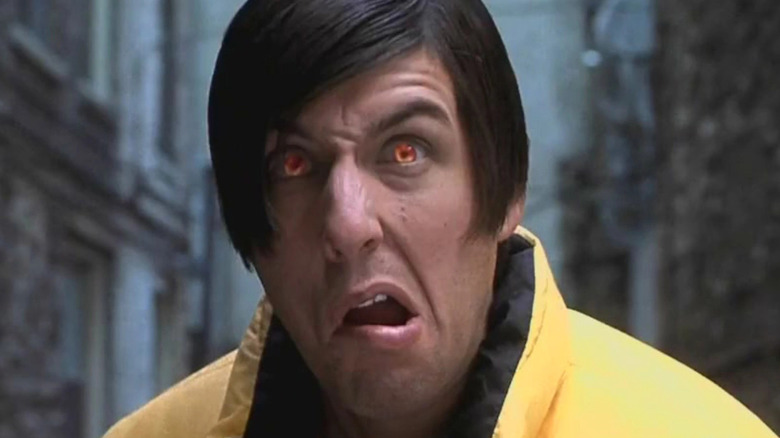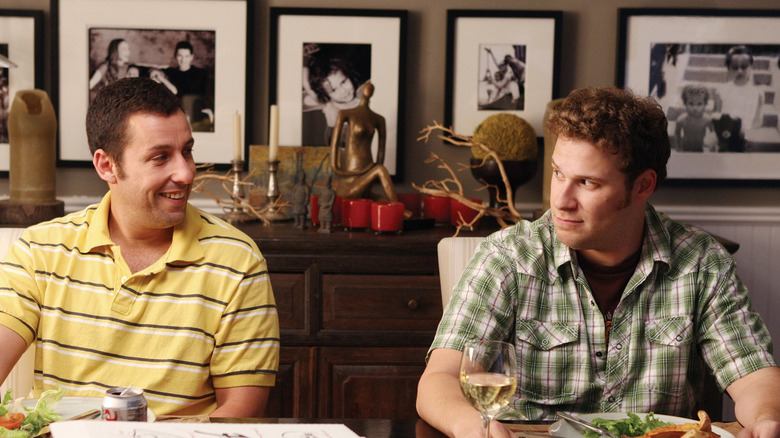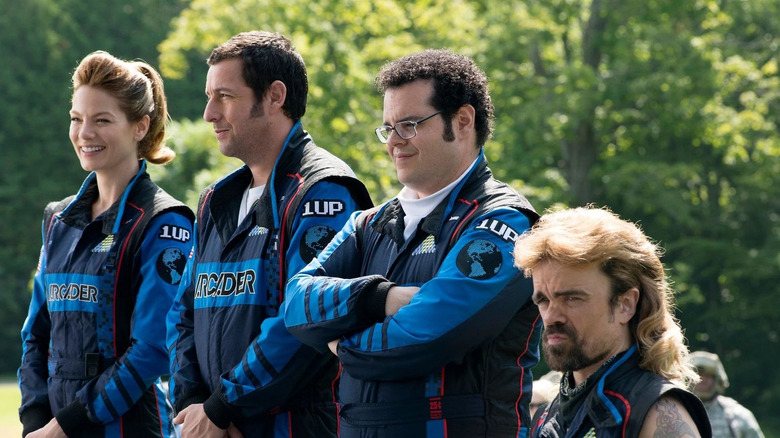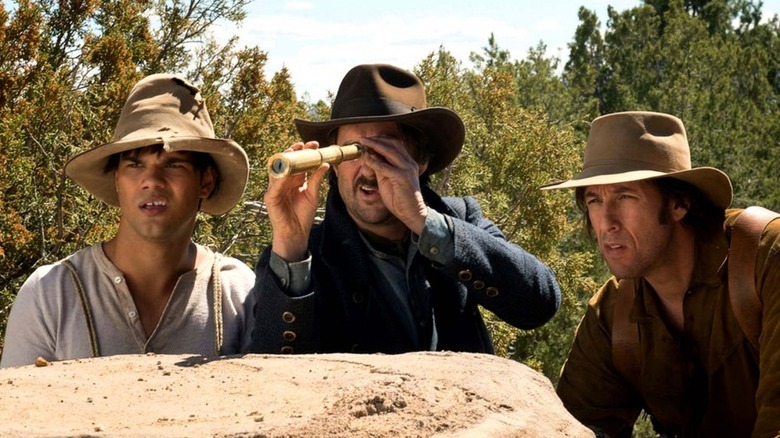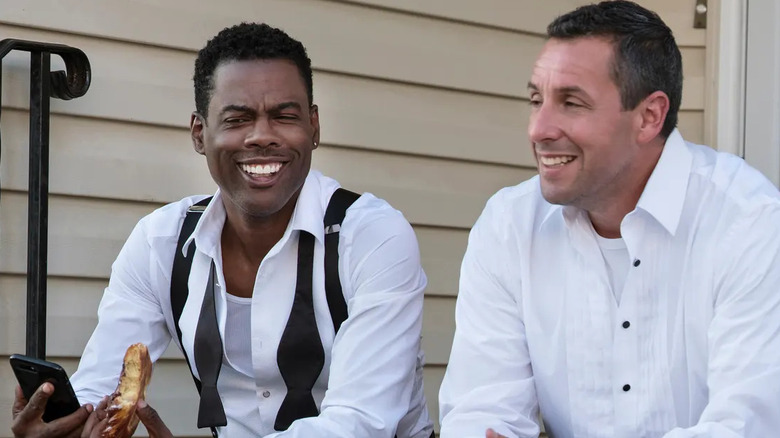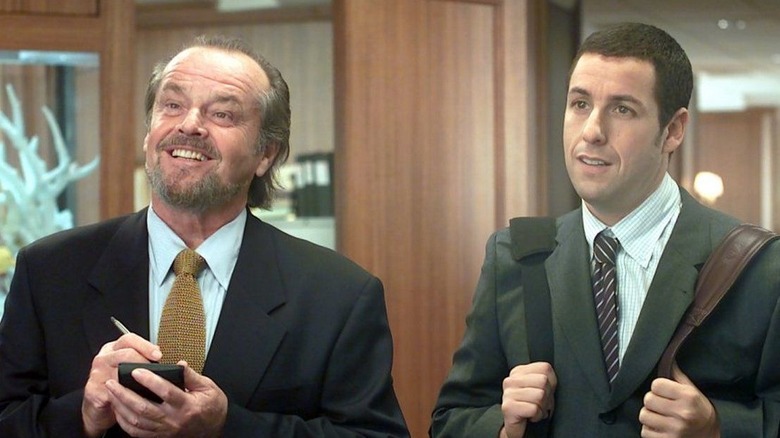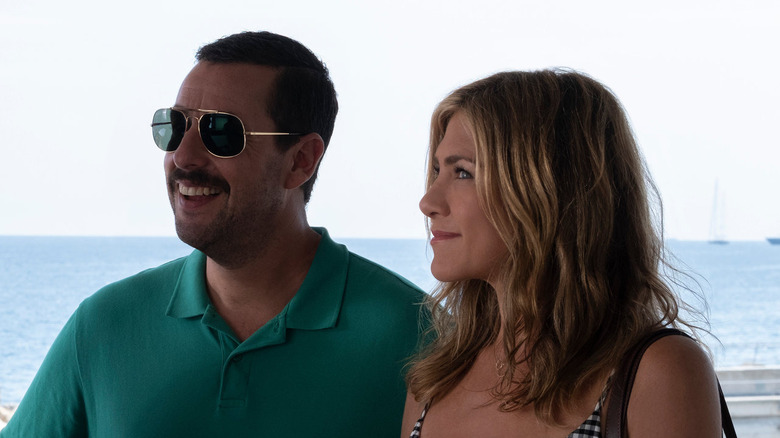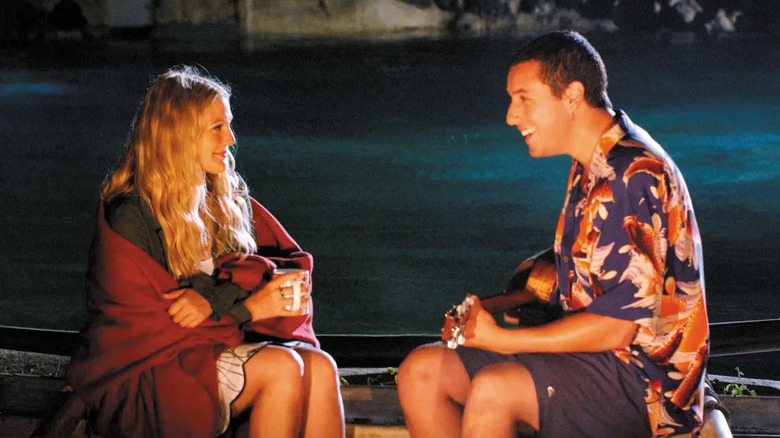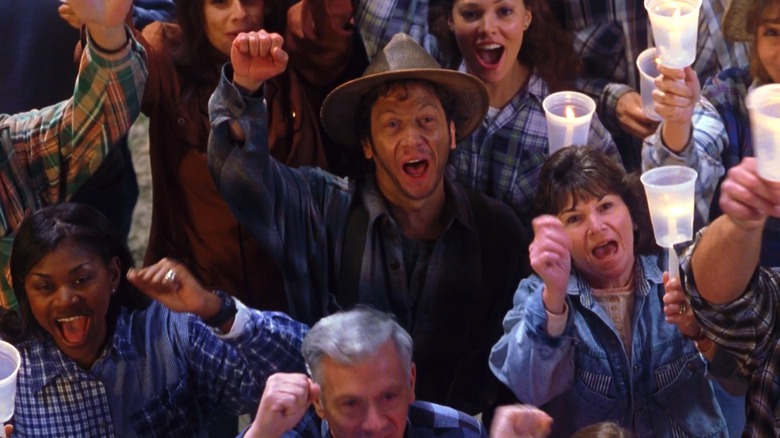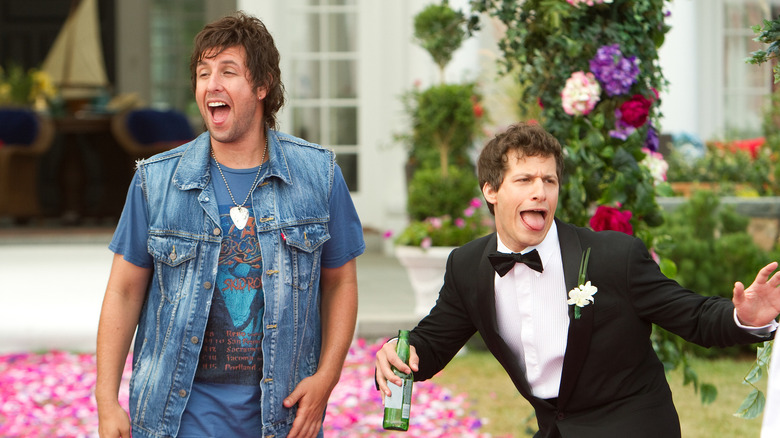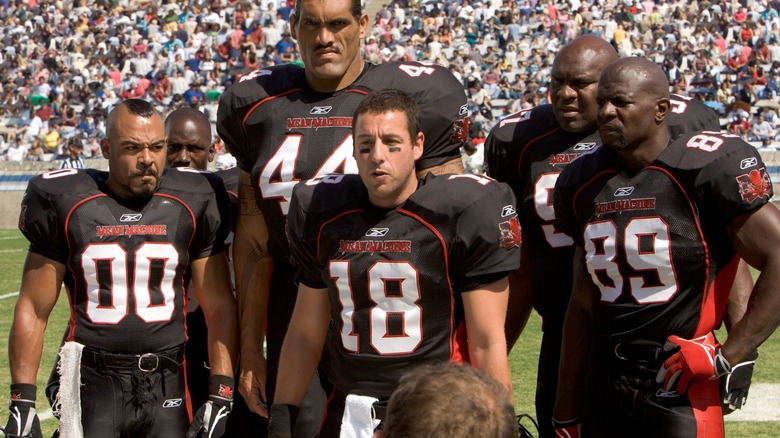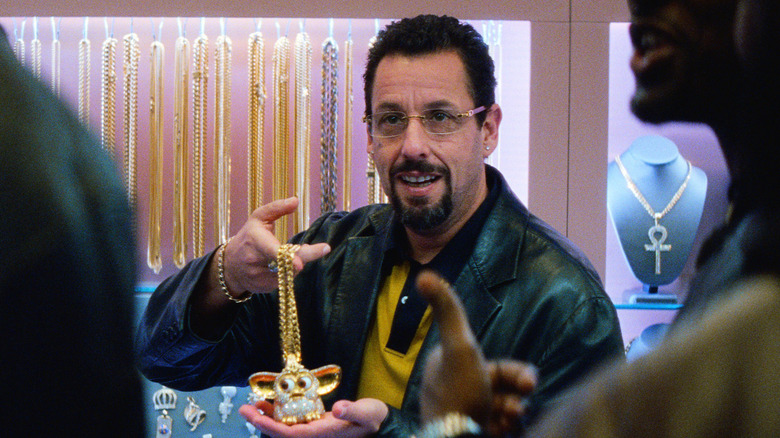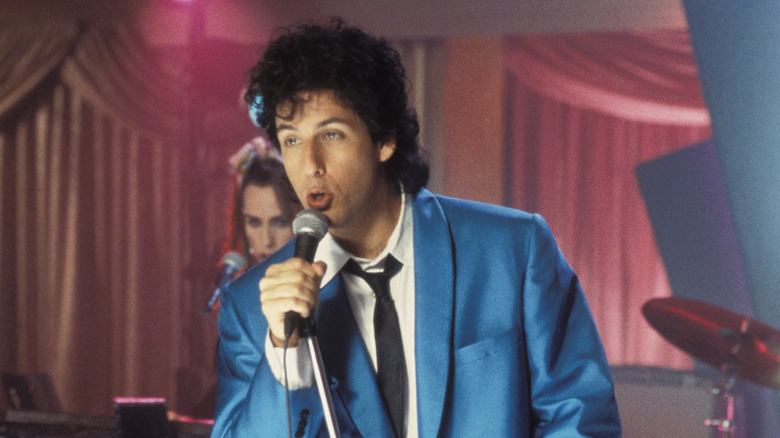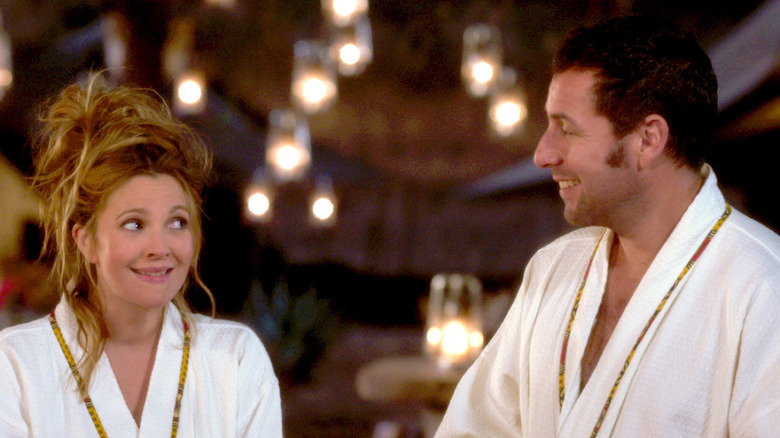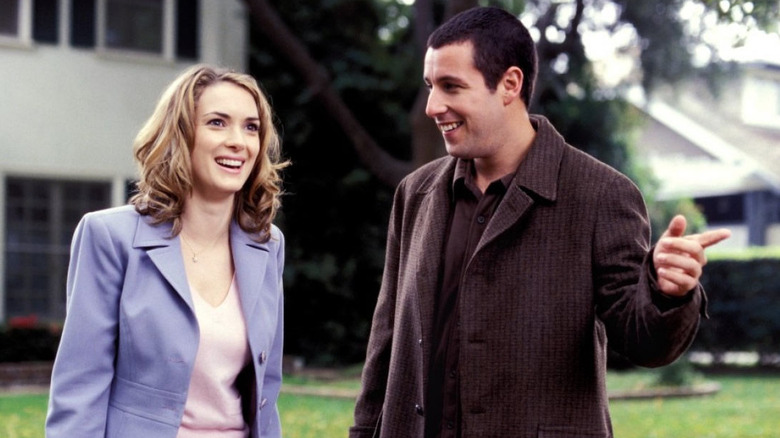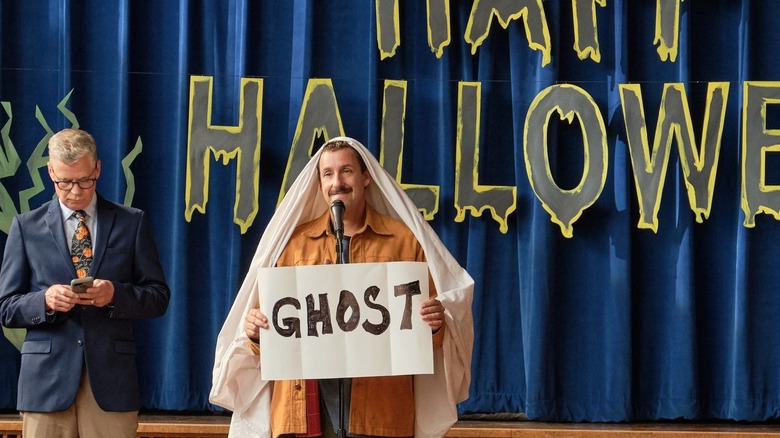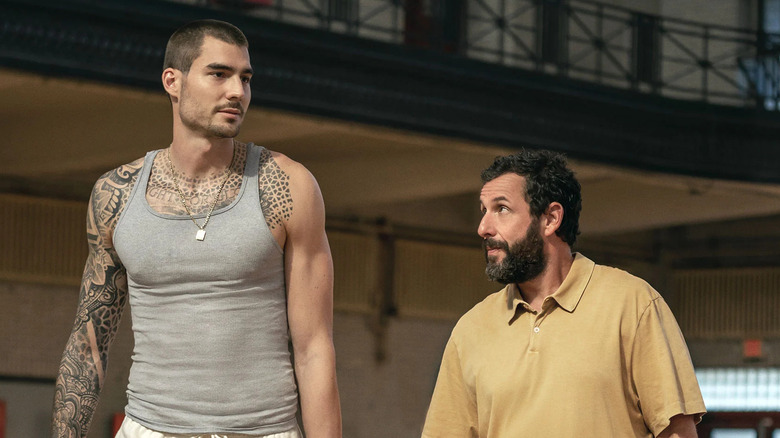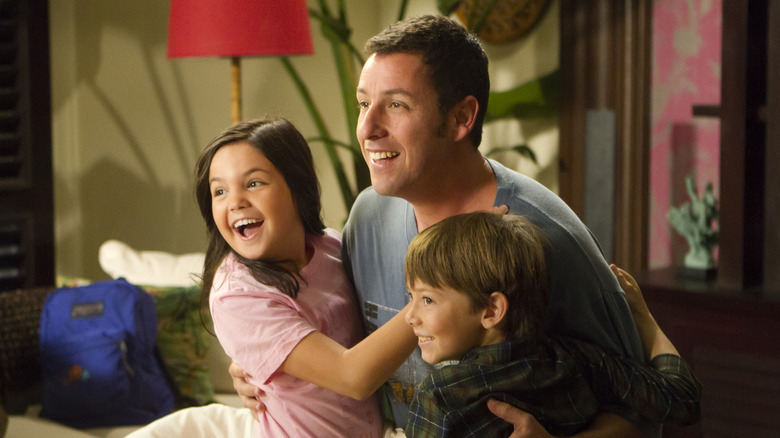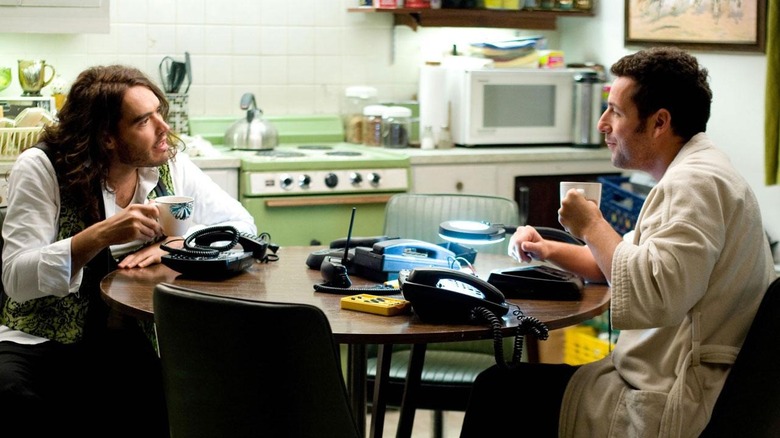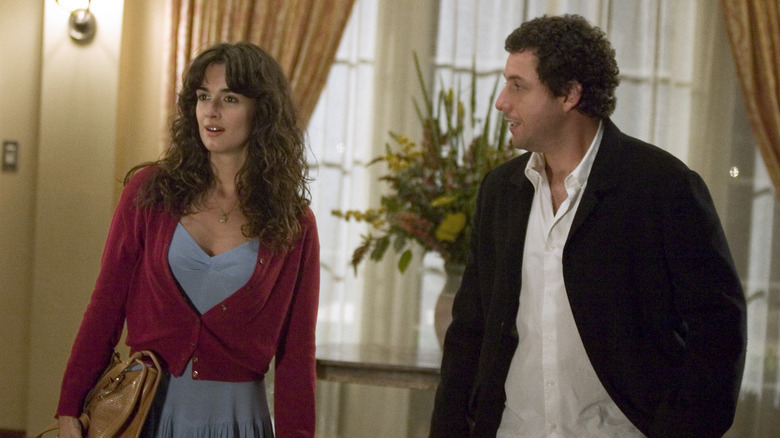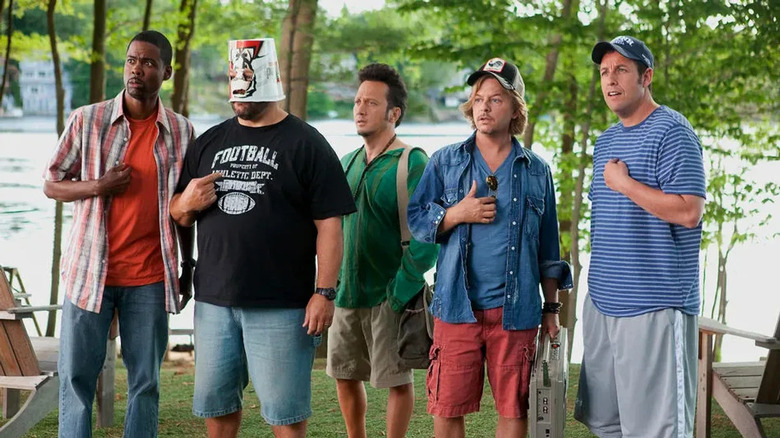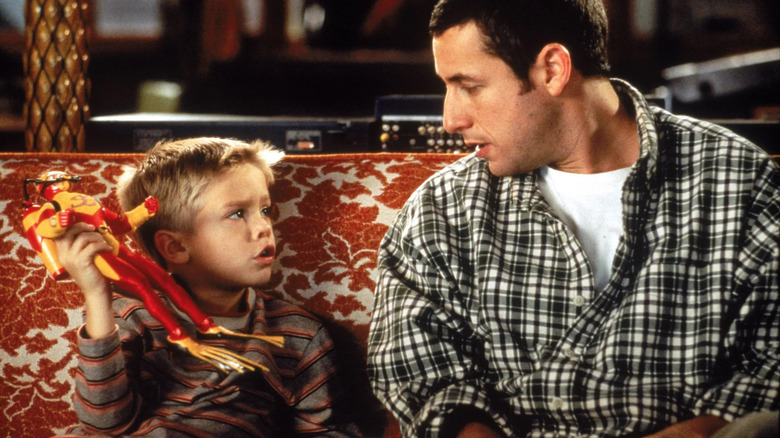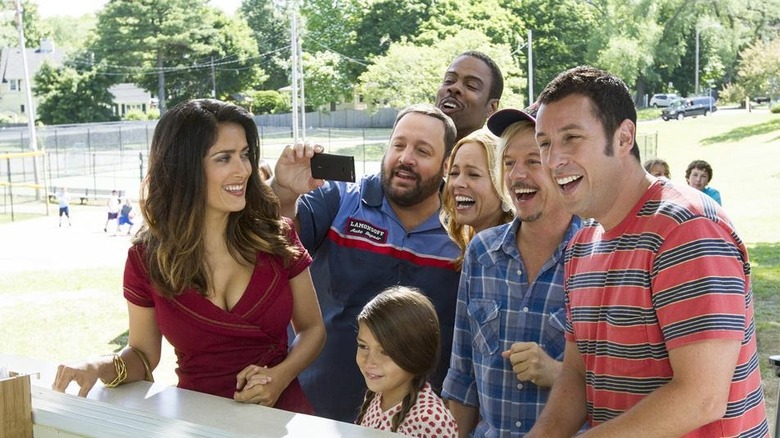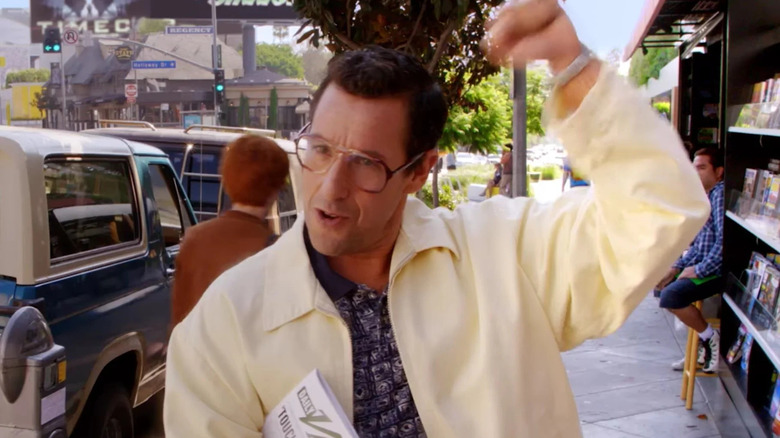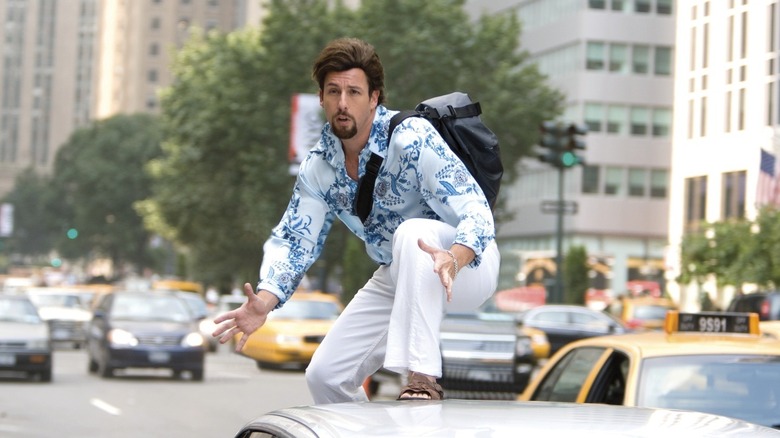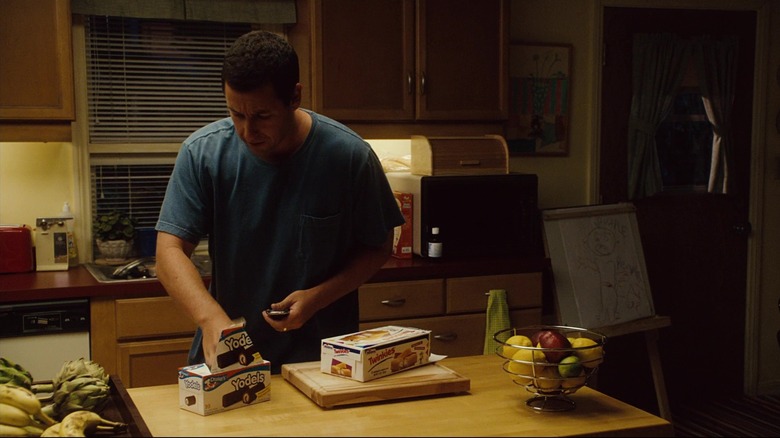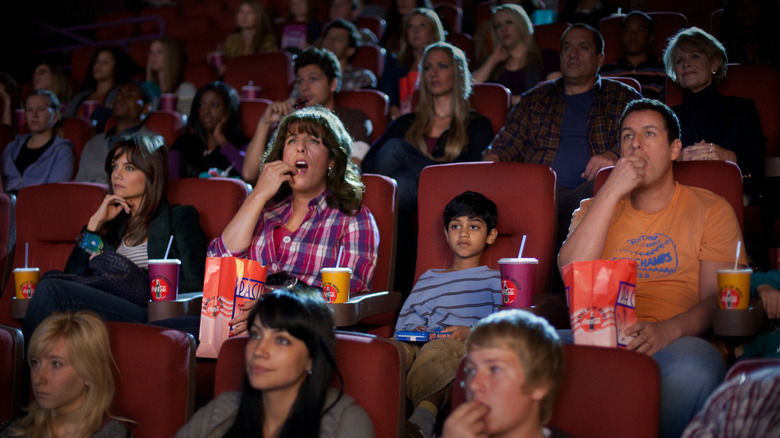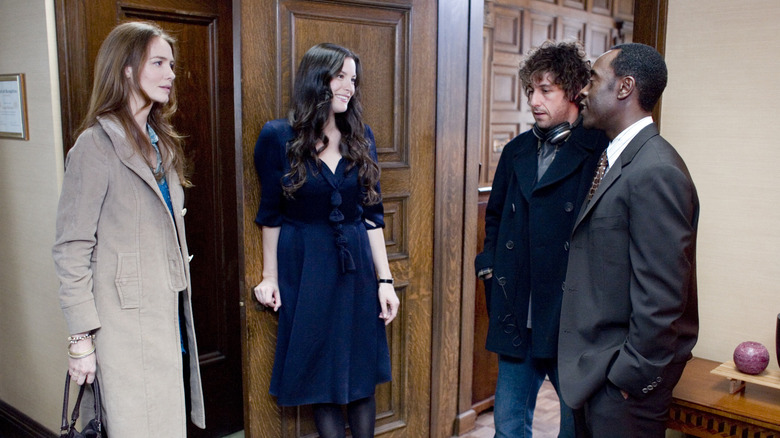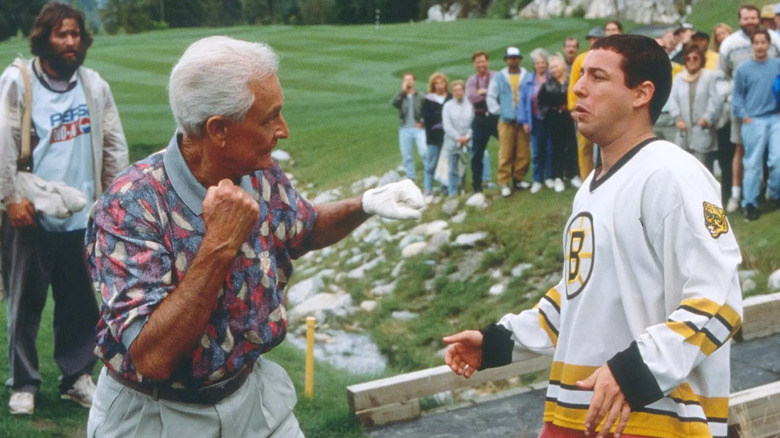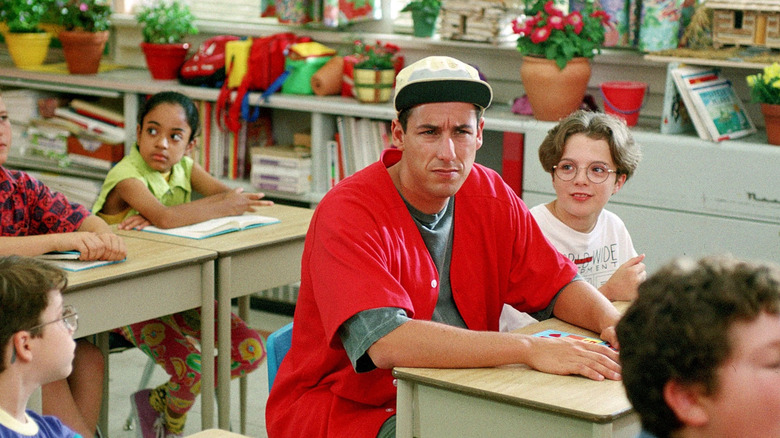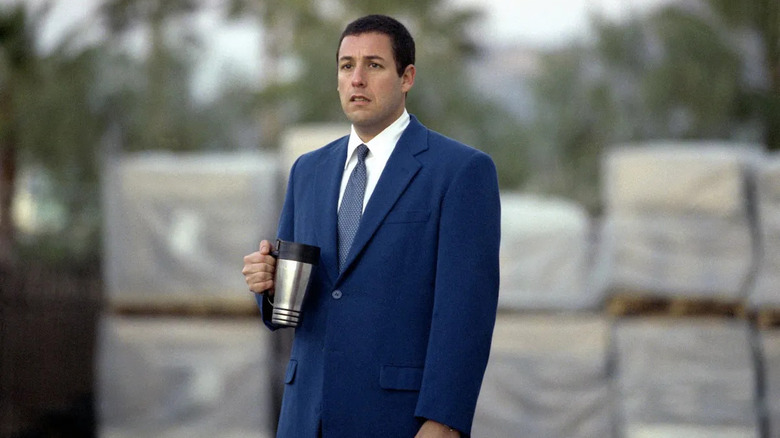The Dumbest Line In Every Adam Sandler Movie Ranked
Adam Sandler is not just a comedy legend — he's a box-office powerhouse whose films have grossed over $5 billion worldwide across 30 years. He's dipped a toe in many different genres, whether it's indie darlings, big-budget flicks, or romantic comedies. On top of numerous Kids' Choice Awards, People's Choice Awards, and Teen Choice Awards, he's taken home nine Golden Raspberry Awards and one Independent Spirit Award. Though his work often rehashes old tricks, there's no denying he's a dynamic force in comedy and drama — as good at playing the goofball as he is an anti-hero.
Though he has maintained an adoring fan base for three decades and continues to navigate his own celebrity as a down-to-earth guy, his movies do not come without their faults, as they're often criticized for lazy writing and a reliance on fart jokes. There's certainly a dumb quote in every one of Adam Sandler's movies, given his urgent penchant for crude and sometimes off-color one-liners. With that in mind, we've compiled the biggest linguistic atrocities from each of his starring vehicles. Here's our selection of some of the very dumbest, from the unforgivable throwaways to the canonical misfires.
This line is just one reason Rob Schneider is the worst part of I Now Pronounce You Chuck & Larry
"I Now Pronounce You Chuck & Larry" received a lot of mixed reviews upon its release in 2007. GLAAD praised the film's call for equality and respect for the LGBTQIA+ community (per Logo). But Rob Schneider's portrayal of an Asian priest and his use of yellowface has garnered a lot of necessary criticism and sours a lot of the movie's attempts at inclusivity (via Salon). It's hard not to think that Schneider's career — reaching as far back as his tenure at "Saturday Night Live" in the '90s — has only been monetarily successful because of his friendship with Sandler, who, for some reason, still gives him gigs.
Every "Chuck & Larry" scene Schneider is in is an embarrassing laughingstock (and not in a good way), as the actor notches another entry in his problematic performance rolodex. This particular nothing of a line comes when he officiates Chuck (Sandler) and Larry's (Kevin James) wedding at a Niagara Falls wedding chapel: "Now place the ring on his hand. A ring is like a circle, it goes on forever. It's not like a triangle. Triangle have corners. It's like a circle."
Screenwriters Barry Fanaro, Alexander Payne, and Jim Taylor could have used any other kind of wacky character in this instance, but they, apparently, needed Schneider to parody an Asian man.
A schneriously terrible line from Little Nicky
After making five pretty solid comedies in a row through the late '90s — "Billy Madison," "Happy Gilmore," "The Wedding Singer," "The Waterboy," and "Big Daddy" — Sandler returned in the new millennium with "Little Nicky," a head-scratching critical and commercial flop starring Sandler as the son of the devil (Harvey Keitel) on a quest to stop his demonic brothers (Rhys Ifans and Tommy Lister) from conquering the Earth.
But "Little Nicky" is a bad movie because of poor execution, not because of a poor premise. Sandler playing the titular Nicky with a hoarse, hushed voice was an odd choice, and but even worse was the film's depiction of Hitler (Christopher Carroll) in Hell. Hitler jokes are, to put it lightly, difficult to pull off in good taste, and "Little Nicky" goes a bit overboard on them, even opening the film with Satan shoving a spiked pineapple up the fascist's rump. On top of that, Carroll employs a stereotypical faux-German dialect that turns the character into parody, as typified in the bizarre delivery of the line, "You're schnerious?"
While there's certainly something to the idea of defeating evil by laughing at it in the Mel Brooks tradition, Sandler is, frankly, no Mel Brooks.
A tasteless Harry Potter ramble is a low point of Funny People
One of Judd Apatow's better directorial showings, "Funny People" wonderfully balances the hilarious with the devastating as comic George Simmons (Sandler) mentors Ira (Seth Rogen), a struggling stand-up performer. George is battling a likely fatal disease, and Ira is making no gains on stage. They're a match made in dysfunctional heaven. Sandwiched in-between "Bedtime Stories" and "Grown Ups," "Funny People" is where Sandler delivers a stroke of meta genius, as he plays a more egotistical version of himself.
There are few hiccups across the movie's 146-minute runtime, but Jonah Hill's performance as Leo, one of Ira's roommates, is a particular misstep. In a filmography that's seen some real winners and even two Oscar nominations, this role is one of his all-time worst. He's dry, shallow, and downright annoying. The character's claim to fame is going viral for a YouTube video of him playing with kittens, and his stand-up routine is monotonous and womanizing. At least when Ira does stage work, it's mostly self-deprecating. But Leo's comedy just doesn't land, especially one particular throwaway ramble. "I just came back from the new Harry Potter movie. Harry's getting old," Leo says. "He's, like, older than my dad. They should start calling him Harold Potter." He then makes a crack about Emma Watson's bustline that puts a tasteless button on a lazy non-joke.
The lazy outlook of Pixels is summed up in one thud of a joke
Directed by Chris Columbus – yes, the guy who helmed "Home Alone," "Mrs. Doubtfire," the first two "Harry Potter" films, and "Rent" — "Pixels" is Sandler's dull and dim, bro-heavy rendition of "The Lego Movie." On the surface, it's about a gang of old-school arcade players (Kevin James, Sandler, Josh Gad, Michelle Monaghan, and Peter Dinklage) fighting an alien invasion, but its concept is outweighed by the script's abundant sexism and flat 1980s nostalgia — somehow outmuscling the cash-grabbing schmaltz of "Grown Ups."
The movie's humor is typified by one particular joke from Sandler's character, Sam. "I was supposed to have a baby with my ex-wife," Sam complains. "And the doctor who was helping us make the baby did help us make the baby, but unfortunately I wasn't in the room." This throwaway line about adultery isn't meant to have any lasting effect. Instead, it's just one of many cheap punchlines in a movie brimming with them. In "Pixels," the women are viewed as prizes by the men, and we are urged to feel sorry for the plights of the latter. Luckily, its Rotten Tomatoes scores show that audiences caught on to the dumbness of "Pixels" as well, and (to no surprise) it was massacred by critics.
Plenty of lines in The Ridiculous 6 are offensive, but this one's just dumb
Sandler is no stranger to bad critical reception or Golden Raspberry awards, but "The Ridiculous 6" resides at the bottom of his acting barrel. Clocking in with a 0% Rotten Tomatoes critics score, the movie is a tedious undertaking with a bad script, poor acting, and dull, off-color jokes.
A project with frequent directorial collaborator Frank Coraci, Sandler and Tim Herlihy's writing horribly fails the movie's huge ensemble cast. Industry mainstays like Terry Crews, Taylor Lautner, Harvey Keitel, and Luke Wilson turn in subpar performances that can't save the tone-deaf, whitewashing mockery that the story makes of Apache culture.
"I did a real stupid thing that inadvertently led to the death of a United States president," Danny (Wilson) bemoans. "I'm feeling pretty lousy about it." There are many lackluster one-liners to choose from, but this dud takes the cake — at least among the ones even worth discussing, as it makes no sense in the context of the entire narrative but is probably the movie's least offensive misfire. Danny is a current drunkard and former bodyguard of Abraham Lincoln, and believes he's the reason John Wilkes Booth succeeded in assassinating the 16th president. "The Ridiculous 6" was the first of Sandler's collaborations with Netflix, and thankfully every succeeding one has been better than this abomination.
Unlikely unsensitivity in The Week Of
In his fourth collaboration with Netflix, Sandler put together a buddy comedy with Chris Rock about two fathers, Kenny (Sandler) and Kirby (Rock), getting to know each other throughout the week of their children's wedding. Rock and Sandler have undeniable chemistry that dates all the way back to their days on "Saturday Night Live" together in the early '90s. But in "The Week Of," they ditch their comedic prowess and just go through the motions as middle-aged A-listers in a "Father of the Bride" rip-off. As Peter Debruge noted in "Variety," it's as if Sandler was on autopilot and phoning it in. In the process, his script leans heavily on tired punchlines.
The worst culprit comes early in the movie, when Kenny's Uncle Seymour (Jim Barone), who is a bilateral amputee, comes to town for his great niece Sarah's (Allison Strong) big day. When an attendant wheels Seymour over to Kenny, he proclaims, "This is an airport wheelchair and I'm actually going to need it back." This means Kenny has to carry his uncle out of the airport. It's a set-up for an upcoming gag, when Kenny carries Seymour through the front door of his house and shocks the rest of the family, but no trained worker (or compassionate human being) would force a disabled man to get out of his wheelchair in the middle of a crowded airport—or anywhere, really.
One line stands out among Anger Management's many grating screamfests
With a stacked cast and Peter Segal in the director's chair, "Anger Management" had a lot of great potential. A combination of Sandler, Jack Nicholson, Marisa Tomei, and John C. Reilly (in an uncredited role) should be flawless comedic synergy. Unfortunately, though, the result is a one-note, flat overkill of yelling. "Anger Management" made a lot of money, though, continuing Sandler's streak of nine-figure grosses at the box-office.
After Dave (Sandler) loses his temper on a flight, he is sentenced to undergo anger management classes with Dr. Buddy Rydell (Nicholson) to avoid jail time. Buddy is confrontational and unorthodox in his methods, and pushes Dave to the edge of his sanity. A precursor to boundary-disrespecting comedies of the aughts like Robin Williams' uncomfortable "License to Wed," "Anger Management" is one of Nicholson's last on-screen roles. Thankfully, his stellar work on "The Departed" three years later would make up for his cartoonish portrayal of an unhinged counselor.
Though it's actually spoken by another character — John Turturro as Chuck, another anger management patient — one line really sums up the level of crass, grating loudness that defines the movie: "What, do you think you're better than me 'cause you got both your nuts?" Hilarious.
A lazy joke about lazy sex in Murder Mystery
"Murder Mystery" might just be the best of Sandler's Netflix movies, because it finds the comedian dabbling in the whodunit genre without trying to reinvent it. When Nick (Sandler) and his wife Audrey (Jennifer Aniston) take a trip to Europe for their 15th anniversary, they stumble into a murder investigation on a billionaire's yacht. It's a premise that's been done a thousand times over, but Sandler actually looks like he's having fun here. Whether that's because he filmed "Murder Mystery" and "Uncut Gems" back to back, or because he needed to bounce back from the lackluster "Sandy Wexler," it's a refreshing turn in Sandler's career.
While Aniston glistens in her role, Sandler does what he is wont to do, which is reuse the same punchlines he's had in his back pocket for over 20 years. "Did you ever fool around on a boat?" Nick asks at one point. "I just lay here and the boat does all the work." When he makes this passive sex joke, it's safe to say it misses the mark. "Murder Mystery" is Sandler playing it safe, but it is the better of his two collaborations with Jennifer Aniston (the other being the critically maligned "Just Go With It"), and it was even good enough to warrant a sequel.
The laughs turn weirdly mean in 50 First Dates
One of Sandler's more beloved flicks, "50 First Dates" finds him playing Henry, a marine veterinarian with a fear of commitment. This 2004 rom-com reunites the comedian with his "The Wedding Singer" co-star, Drew Barrymore, who plays Lucy, a woman with short-term memory loss who relives the same day over and over. It's a more romantic "Groundhog Day," but it lacks much in the way of emotional depth. There are a lot of crude jokes, of course, because it wouldn't be an Adam Sandler movie without them.
The movie's treatment of amnesia is its lowest point, as we watch some characters deliver unsympathetic opinions about Lucy. Though her dad (Blake Clark) and brother (Sean Astin) believe her condition has rendered her unable to hold a relationship, it's Dr. Keats' (Dan Aykroyd) sentiments that sour the most. "Sometimes I wish my wife had Goldfield Syndrome," Keats cracks. "That way she wouldn't remember last night when I called her mother a loud, obnoxious drunk with a face like J. Edgar Hoover's a**."
It's easily the dumbest in the entire movie, as it takes the traumatic reality of memory loss and turns it into a punchline. To wish something like that on your spouse is ridiculous, and the movie could've endured just fine without it.
Rob Schneider coins an obnoxious catchphrase in The Waterboy
Keeping up with Sandler's impressive run of nine-figure box office hits in the late '90s, "The Waterboy" finds the actor following up "Happy Gilmore" by returning to the sports comedy genre with ferocity. It's the story of Bobby Boucher (Sandler), a socially inept Cajun waterboy for the University of Louisiana's football team, and his evolution into a feared, world-class linebacker. With wonderful supporting turns by Kathy Bates, Henry Winkler, Jerry Reed, and Fairuza Balk, "The Waterboy" is one of the more charming entries in Sandler's filmography.
But the most moronic thing in "The Waterboy" is how most of the actors, including Sandler, deliver very exaggerated and insulting renditions of Cajun accents. At the top of the pyramid is Rob Schneider's character, known only as "Townie," a Bayou man best known for an annoying one-liner. He and many other locals rally at the hospital where Boucher is holding vigil at his mother's (Kathy Bates) bedside while she's in a coma. They try convincing him to play, aided by Townie shouting, "You can do it! You can do it all night long!" Where Bobby actually has depth and purpose, Townie is a one-trick-pony. Cajuns have long been the victims of many dishonest portrayals in film (per NOLA.com), and it's hard to look past that Schneider as one of the worst offenders.
That's My Boy tries too hard to show how out-of-touch its lead is
In "That's My Boy," Sandler plays Donny Berger, a middle-aged alcoholic and one-time teen celebrity (with a decidedly skeevy claim to fame), who is trying to reconnect with his son Todd (Andy Samberg). It's one of the actor's worst all-around performances, as Donny holds no depth and is played with an adult version of Sandler's "baby talk" dialect. Most of the jokes retreat back to the premise of Donny having sex with his teacher, and not even the always-charming Samberg (or Vanilla Ice, for that matter) can redeem those misfires. The movie being a box office and critical bomb comes as no surprise.
"Facebook?" Donny asks at one point. "You know I can't afford that s***. What am I, a billionaire?" This line is supposed to emphasize how disconnected from contemporary life Donny is, but it misses the mark. Even if Donny wasn't on Facebook, how could he not know that it's always been a free website? Donny still driving a Pontiac Fiero with Rush's Starman logo painted on the hood is a great way of showing how stuck in the past he is, but as is the case with most Sandler movie flounders, the script takes the jokes a hair too far in a weird direction.
Cheeseburger Eddy's failed rhymes just make The Longest Yard awkward
As far as comedy remakes go, Sandler's makeover of "The Longest Yard" is one of the genre's better entries, arriving in theaters in 2005 around the same time as "The Bad News Bears," another re-do of a beloved '70s sports flick. Sandler's version stays true to the original material — an exhibition football game between prison guards and the prisoners they lord over — with the actor's textbook crude humor added for additional (and often successful) effect. Unlike how the original put a great focus on Burt Reynolds' turn as Paul Crewe, the remake makes a greater pivot toward its supporting cast. With performances by members of the original cast, including Reynolds and Ed Lauter, the final product feels more like an homage than a cash-grab.
"The Longest Yard" introduces a few new characters, and having such an expansive, cast-heavy movie opens doors to some misfires in the script. The victim here is Cheeseburger Eddy (Terry Crews), whose pre-football role as the prison's local McDonald's smuggler is a cartoony addition to an otherwise sharp supporting crew. "I knew you couldn't resist my sh**! I got the shakes that'll make you quake," Eddy boasts in an introductory rhyme. "I got the fries that'll cross your eyes! I got the burgers that'll ... I just got burgers." Though Crews does his best, the half-hearted joke isn't clever enough to avoid landing with a thud.
The worst line from Sandler's best performance
In a film brimming with quotable moments, this is one of those lines that was funny for a few weeks and then turned incessantly annoying. Even if you haven't seen the movie, there's a good chance you've seen the line used as a reaction gif or screencap online: "Holy s***, I'm gonna c***." Quotes that become memes tend to become overwrought in some capacity as days pass, and though "Uncut Gems" is the Safdie Brothers' best movie — and Sandler's performance as New York City gem dealer Howard Ratner is an undisputed career high point — the movie is not free of jokes that fall flat amid awkward moments. Given that Sandler delivers the line in an otherwise nerve-wracking scene, the cringe dialogue pierces through a palpable, edge-of-your-seat string of beats.
The cherry on top arrives when the Safdies use CGI to dilate Sandler's pupils to the size of pebbles (via The AV Club), a goofy trick that takes the viewer out of the scene for a second. But ultimately, what prevents this line from being anywhere near the dumbest one on the list is that it does indeed feel like something the character would not only say, but has said numerous times before. The quote is the dumbest part of a good movie, but still totally believable in context.
The moment Robbie gets a little too angry in The Wedding Singer
"The Wedding Singer" endures as one of Sandler's best movies. Released in his prime, right after "Happy Gilmore," the comedian plays Robbie Hart, a heartsick reception entertainer who gets abandoned by his own fiancée at the altar. Robbie's got anger issues, but when he meets Julie (Drew Barrymore), everything changes — the tides start to turn, and he learns how to fall in love again. Not only is it a great romantic comedy, it introduced the world to Sandler and Barrymore's electric on-screen chemistry.
Of course, the "nice guy with a broken heart" schtick does get old after a while, but Sandler sells his bummed-out persona well. The comedian's charisma turns a one-trick-pony character into a dynamic, empathetic person. If we have to pick a low point in his dialogue, it's during the scene in which Robbie starts tanking a gig by monologuing about his own sorrows. When the father of the bride protests that he's ruining the reception, Robbie deadpans, "Sir, one more outburst and I will strangle you with my microphone wire. You understand me?"
It's the point when the usually endearing Robbie comes closest to being unlikable, because honestly, the father of the bride has a point. Still, as a low point it fits Robbie's character to a T and is essential to his development. It all culminates in one of Sandler's better endings, when he serenades Barrymore on a plane.
Sandler and Barrymore's third outing is hampered by bad taste
After stealing the show together with their unflinching chemistry in "The Wedding Singer" and "50 First Dates," Barrymore and Sandler reunited for the first time in 10 years to star in "Blended," a romantic comedy about two single parents unintentionally combining their families on a vacation. When divorced mom Lauren (Barrymore) and widowed dad Jim (Sandler) go on a horrible blind date, neither of them wants to see the other again. Awkwardness ensues when they each purchase part of the same getaway package to a South African resort.
There are bad moments of gender and cultural stereotypes, child humiliation, and numbskull one-liners, but the cherry on top comes at the expense of Lauren and Jim's exes. When they make fun of each other's respective journeys to being single, it comes off a bit tone-deaf. " Jokes about suicide just about never land, and often sour the scenes they appear in. That can certainly be said about Jim assuming that Lauren's husband shot himself to get out of their marriage.
It made good money at the box office, but "Blended" is, by far, the worst of Barrymore and Sandler's three movies together. Hopefully they'll get back together again soon and redeem this resounding flop.
Mr. Deeds holds up surprisingly well ... mostly
2002's "Mr. Deeds" is one of Sandler's most underrated films, and it's actually aged pretty well, considering how most of the jokes he employed in his work around that era have not stood the test of time. The comedian plays Longfellow Deeds, the heir to a billion-dollar media conglomerate, who lives in Mandrake Falls, a small New Hampshire town. Deeds gets caught up in a romance with reporter Babe Bennett (Winona Ryder) and a shareholder scheme devised to push him into signing the company over to corrupt CEO Chuck Cedar (Peter Gallagher).
Few things feel out of place in "Mr. Deeds." Even the ludicrous frost-bitten foot subplot makes sense. But Steve Buscemi's "Crazy Eyes," a Mandrake Falls resident who has severe amblyopia, is that one character who becomes less interesting and more annoying with every rewatch. Though his pizza orders (which contain toppings of French fries, Oreos, peanut butter, and gumballs) are good comedic devices, most of his dialogue is unimportant, dumb, and disposable. Case in point: "Time heals all things ... except these crazy eyes."
It's unclear why anyone would be so mean to Hubie
After he was snubbed for an Oscar nomination for his role in "Uncut Gems," Sandler pivoted his focus to "Hubie Halloween," another Netflix collaboration ripe with a monstrously large ensemble cast, including Julie Bowen, Ray Liotta, Kenan Thompson, Noah Schnapp, Shaquille O'Neal, and Maya Rudolph, to name a few. The film's premise is fun and refreshing, as we watch Hubie, the most devoted community volunteer in Salem, Massachusetts, look out for the trick-or-treating kids in town on Halloween night. Pranks and good-natured holiday fun quickly turn into a real murder investigation.
"Hubie Halloween" is one of Sandler's most harmless stories. But when Mary (Rudolph), one of Hubie's old classmates who pranks him constantly, insults him, it misses the mark and goes against the eccentric lightheartedness the film stands for. Specifically, Mary says, "It's pretty impressive how long he's been a loser." It's clear that Hubie is not a loser, but a nice guy who genuinely loves keeping the people in his town safe. It's a weird moment of unjustified bullying that would make more sense if the evidence on-screen backed it up.
One of Sandler's strongest movies still can't resist rehashing a joke
In 2022's "Hustle," Sandler plays Stanley, an NBA scout who stumbles upon a talented Spanish basketball player (Juancho Hernangomez) whose skills are unpolished. It's one of Sandler's better individual performances, as we see him return to a dramatic spotlight for the first time since "Uncut Gems." The supporting cast, which includes numerous real-life NBA players, also turns in surprisingly well-developed character portrayals. "Hustle" is pretty concise from start to finish, making it one of Sandler's most critically acclaimed movies to date and offering little in the way of missteps.
But when we meet Boban Marjanovic — the real-life 7-foot Dallas Mavericks player nicknamed "Big Serbian" who was 33 at the time of the film's release — he claims to be 22 years old and eligible for the draft. The joke is a cheap rehash of one in another Sandler-produced movie, "The Benchwarmers." Even in Sandler's better performances, the well of comedy runs a bit shallow.
Just Go With It really makes a Devlin in its dialogue
In "Just Go With It," Sandler's first collaboration with Jennifer Aniston, a love triangle is built on a 20-year-old lie. When Danny (Sandler) leaves his wedding after discovering that his fiancée has been cheating on him, he realizes that wearing his wedding ring at a bar makes him a prime get for the women he mingles with. Every time, Danny makes up a sob story about a fake wife so he can sleep with his date. It's a terrible premise that, somehow, was viable enough to shoulder an entire feature film. There's simply no shortage of bodily humor and annoying faux-accents to pick through in this one.
But when we learn about Katherine's (Aniston) childhood nemesis Devlin, she reveals that she's taught her kids to refer to going to the bathroom as "making a Devlin." Katherine hates this woman so much that she decides to instill it in her kids, whether consciously or not. What might be an excuse to give the kids in the movie a catchphrase instead misses as a weird and unnecessary running joke.
Bedtime Stories gives someone else a chance to be the gross one
In his first-ever family-oriented film (co-distributed by Walt Disney Pictures), Sandler plays Skeeter Bronson, a hotel handyman who lives in a motel his father owned until Barry Nottingham, the CEO and founder of a big hotel enterprise, buys it through liquidation. The premise of "Bedtime Stories" is one of Sandler's most earnest: Skeeter starts taking care of his niece and nephew while his sister Wendy (Courteney Cox) is out job hunting, and tells them outlandish stories that start to bleed into their own reality.
When you put Sandler in a PG movie, you take away his biggest crutch — crude humor — and he has to flip the script to stay fresh. In "Bedtime Stories," he delivers a warm, heartfelt performance that heavily contrasts his previous movie, "You Don't Mess With the Zohan." In the process, supporting character Mickey (Russell Brand), who works in the hotel kitchen, plays the role of dunce, often spouting off mumbled lines that do nothing for the story. After Skeeter blasts him in the face with ketchup, Mickey dips French fries into it and we are forced to suffer through the grossness. "You know what? Ketchup is good for you!" he insists. "It exfoliates the skin, so who's the real victim here? You are!"
There are gumball rainstorms, Ferraris, and chariots aplenty in "Bedtime Stories," and if you take Brand's character out of the picture, it's one of Sandler's better efforts.
One particular line typifies the misfires of Spanglish
"Spanglish" is a unique point in Sandler's filmography. It was one of the first moments in his career where he didn't have a real hand in the film's production beyond his leading role. Acting in this project from legendary writer-director James L. Brooks gave Sandler enough room to turn in a good performance — one of the better in his career. Unfortunately, sandwiched in-between two blockbusters, "50 First Dates" and "The Longest Yard," it bombed at the box office and critics panned its plot.
The film follows a Mexican immigrant and single mother Flor (Paz Vega) as she and her daughter move into the home of an affluent married couple, Deborah (Téa Leoni) and John (Sandler). "Spanglish," at its heart, is a movie about culture clashes and parenthood, but its sometimes messy plot takes away from Sandler and Vega's great performances. A prime example comes when Leoni delivers the cringeworthy line, "We're wearing the same jumper! That's good boogabooga!"
The silliest line in Grown Ups actually won an award
The premise of 2010's "Grown Ups" makes so much sense, and it's a surprise that it took so long to make it happen. After years of handing out minor acting gigs to all of his friends, Sandler decided to have them all join forces on one singular ensemble movie. The result is Sandler, David Spade, Kevin James, Chris Rock, and Rob Schneider banding together in a feel-good summer comedy. As expected, "Grown Ups" was a smash hit at the box office but maligned by critics, who lambasted the movie as lazy and lowbrow.
It would be hard to expect five hallmark names in comedy to not do what they do best, so the resulting two hours of sex and fart jokes hold few surprises. But the dumbest line in "Grown Ups" comes when the five friends and their families reunite over Fourth of July weekend to honor their recently deceased childhood basketball coach. At a restaurant, after a long debate on what "getting wasted" means, Lenny Feder's (Sandler) youngest child Becky (Alexys Nycole Sanchez) proclaims, "I wanna get chocolate wasted!" Though the line would win an MTV Movie Award for "Best Line from a Movie," it remains possibly the movie's most annoying.
Some weird narration in The Do-Over wastes time in a convoluted story
"The Do-Over" is one of Sandler's better Netflix movies. It's a buddy comedy that begins with two guys, Max (Sandler) and Charlie (David Spade), faking their own deaths and assuming false identities so they can get a second chance at life. But the movie quickly turns into a complicated action movie involving assassins and a rare cancer treatment. Writers Kevin Barnett and Chris Pappas attempt to do suspenseful justice to the convoluted concept, but there are simply too many moving parts and not enough cohesion.
A big detriment to the movie is Spade's voiceovers. Narration can so easily become a storytelling crutch, but when done right (see "Goodfellas," "The Shawshank Redemption," and "Stand By Me"), it's an achievement. In "The Do-Over," though, it's done in the service of unnecessary exposition, as if the writers didn't have enough faith in the rest of their script or the acting of Sandler and Spade.
Out of all of Spade's incessant narration, one monologue is the most head-scratching. "You know, a good friend of mine once told me, you have to have a rubber in your wallet and an umbrella in your trunk, 'cause you never know when you're gonna f*** in the rain," the character rambles. "He also suggested carrying around zombie makeup for those times when you want to strike terror into the hearts of people who screwed you over.
Big Daddy is surprisingly sweet, except when it turns uncomfortably nasty
"Big Daddy" is the last entry in a run of five huge hits that starred Sandler in the late '90s. He's never had a stretch in his career like that since, so ending that illustrious five-year period with "Big Daddy" is much sweeter in retrospect. Sandler plays Sonny Koufax, a law school graduate in his 30s who lives off of the rewards from a settlement, refuses to take the bar exam, and can't find a full-time job. After his roommate Kevin (Jon Stewart) leaves on a business trip to China, a five-year-old boy named Julian is left on their doorstep with a note claiming that Kevin is his biological father. Fearing that Julian will get placed in an orphanage, Sonny elects to take care of him until Kevin returns.
An immature adult coming into his own is a trope that Sandler loves tapping into, but in "Big Daddy," he takes it one step further by portraying someone who does that while also learning how to truly care for another human being. Watching Sonny go through the ups and downs of raising a child is something many can empathize with, and there are a lot of laughs and uncomfortable moments in tow. But when he learns that his girlfriend Vanessa (Kristy Swanson) is cheating on him with an older man named Sid (Geoffrey Horne), he uses their breakup as ammo for why he is suddenly unable to keep looking after Julian — and it's just a bad look all around. "I had a mother lined up for him," Sonny complains, "but she's bangin' the Pepperidge Farm guy and the kid won't stop peeing and throwing up, he's like a cocker spaniel."
Grown Ups 2 makes a kid so sarcastic he just seems dumb
No one asked for "Grown Ups 2," but after its predecessor made $271.4 million at the box office, a sequel was a no-brainer. With a cast as hilariously dynamic as this one, it will always have a large crossover appeal to multiple fanbases — though given Sandler's widening impact, they all tend to overlap more often than not. Sometimes, though, the material just can't be saved by four guys who've made a lot of money telling fart jokes.
On paper, a bunch of men whose glory days were in the 1980s trying to bond with their children should make for a generational clash that sparks some great moments. Sadly, the script fails to conjure anything beyond a cliché divide and, when Bean Lamonsoff (Frank and Morgan Gingerich) delivers one particular anti-nostalgia line, it just feels like it's trying too hard. "The '80s?" the kid asks incredulously. "That was 70 years ago."
Yes, Eric's (Kevin James) son is young and it's a joke about a child's view of time passing, but how have we continued to let this nonsense endure on-screen? Does anyone not teach their children the concept of decades anymore? "Grown Ups 2" is a bad movie, as critics and audiences equally agree, ripe with script misfires and one-liner duds. At least Schneider didn't reprise his role as Rob Hilliard for this one.
A line of dialogue makes a dumb reveal in Sandy Wexler
For all intents and purposes, "Sandy Wexler" is a harmless movie nestled gently among Sandler's run of Netflix projects. Like some of its made-for-streaming contemporaries, it's neither stunningly good nor bad — it's very middle of the road. Sandy (Sandler) is a Hollywood talent manager in the 1990s looking for the next big thing, which he believes he's found in Courtney Clarke (Jennifer Hudson), a Six Flags stage show performer. Under his guidance, Clarke records numerous hit singles and is on her way to stardom. But Sandy's penchant for eccentric lying quickly becomes a hindrance to her career.
When Clarke gets into a studio for the first time, her singing seemingly makes the lights go out — until someone makes an observation about Sandy: "He's leaning on the light switch." It's a perfect example of one of Sandler's biggest flaws: he gets lazy with his material and rests on a hodgepodge of age-old, overwrought comedic beats. On top of a way-too-long runtime of 131 minutes, the sloppy script — an improvement over "The Ridiculous 6" but not quite as memorable as "The Do-Over" — feels extra bloated with punchlines that audiences can telegraph from a mile away.
You Don't Mess with the Zohan has dialogue that can't live up to a clever premise
In his fourth collaboration with director Dennis Dugan (after "Happy Gilmore," "Big Daddy," and "I Now Pronounce You Chuck & Larry"), Sandler plays an Israeli army counter-terrorist commando who fakes his death so he can become a hairstylist in America. "Zohan" is the closest Sandler has gotten to a superhero movie — aside from maybe "Pixels" — and it's a decent satirical action flick that made a boatload of money at the box office. John Turturro, who plays Zohan's nemesis Phantom, has great chemistry with Sandler, and the two surpass even the warmth of their previous on-screen kinship in "Mr. Deeds."
The fight sequences between Phantom and Zohan are hilarious. The dialogue, however, is sometimes less so. The premise of Zohan wanting to become a hairstylist after spending years killing people is one of Sandler's most-original and entertaining, the way the film's titular hero talks about his dreams ("I just want to make people silky smooth!") is a miss.
Click's throwaway junk food dud
"Click" is a much better movie than critics give it credit for. With an emotional ending and great supporting performances from Henry Winkler, Jake Hoffman, and Kate Beckinsale, Sandler took a script brimming with fart jokes and turned it into an admirable take on Frank Capra's "It's a Wonderful Life" trope of a guy learning not to take his life for granted. In "Click," Michael Newman (Sandler) is given a universal remote control by the Angel of Death (Christopher Walken) and must balance family with greed and careerism.
A lot of the jokes in "Click" are actually pretty great, especially Michael's great TGI Friday's riff and the recurring attraction between the family dog Sunshine and a giant stuffed duck. His weird relationship with cough syrup at the beginning of the movie feels off, though, as if they needed Sandler to deliver a throwaway line about why his universal remote control can fast-forward his life. And he does: "I guess when you combine mass quantities of cough syrup with Yodels ... you get acid." Also, who chooses Yodels over Twinkies?
Jack and Jill is just about the lowest of the low
Though "The Ridiculous 6" is Sandler's worst-reviewed movie (according to Rotten Tomatoes), "Jack and Jill" held that title for a half-decade. The concept is simple, overwrought, and offensive: Sandler plays both siblings Jack and Jill, cross-dressing in the process and delivering a dual performance that is as lifeless as it is annoying. How "Jack and Jill" coaxed out a great, over-the-top performance by Al Pacino (as a satirical version of himself) is beyond explanation. But Pacino's turn as a washed-up Oscar winner who strictly does commercial work, doesn't even come close to making this movie watchable.
Every interaction between Jack and Jill in the film is an embarrassing moment to watch unfurl. Sandler's attempt at playing the female version of himself falls flat as he just puts a feminine tinge on his patented "baby talk" voice. Case in point: "Why are you so afraid to admit that we are connected?" Jill asks Jack. "Face it — we shared Mom's womb. We were womb-mates." Lines like this solidify "Jack and Jill" as one of Sandler's most irredeemable movies, still a particular low-point in his career.
One line undercuts the drama of Reign Over Me
"Reign Over Me" was Sandler's first dramatic turn after "Punch-Drunk Love," and it remains an underrated part of his filmography, proving that the comedian possesses an incredible ability to carry any sort of movie. As Charlie, a former doctor who lost his wife and children in the 9/11 terrorist attacks, Sandler does an admirable job portraying someone whose immense PTSD has left him shattered and reclusive. He finds refuge in the music of Bruce Springsteen, rides his scooter across New York City, and paces around the apartment where he and his wife raised their kids. When his former college roommate Alan (Don Cheadle) runs into him in Manhattan, he feels obligated to help his old friend get his life back together.
Meanwhile, Alan is being stalked by one of his dental patients, Donna (Saffron Burrows). After Donna meets Charlie, she tries to sum up his situation: "I don't know how they can't see that he's just got a broken heart," she says. "It's so broken, his poor heart." The line feels like it's in pretty poor taste, as it suggests that someone dealing with this kind of trauma is simply nursing a broken heart. Though the plot runs uneven at times, and the melodrama sometimes treads tacky waters, it's generally an earnest look at life after 9/11, and a very intimate portrait of someone whose life was especially upended by the tragedy. To suggest that Charlie is battling a grief as treatable as a breakup misses the mark on the movie's overall theme — that community can help in coping with trauma, but piecing someone's life back together takes a lot more empathy.
Some heckling is just as annoying to the audience as it is to Happy Gilmore
Aside from a few nitpicks, "Happy Gilmore" is, for all intents and purposes, a near-perfect movie that found Sandler riding the high of "Billy Madison" straight into another comedic milestone. But there is one piece of dead weight dragging down "Happy Gilmore" in the character of Donald (Joe Flaherty), a heckler hired by Shooter McGavin (Christopher McDonald) to ruin Gilmore's (Sandler) golf game.
Donald first appears at a pro-am when Gilmore is paired with "The Price is Right" host Bob Barker. The heckler's oral jabs at Gilmore flick a switch of rage deep within the former hockey amateur, leading to not only a terrible round on the scorecard, but an actual fist-fight between Gilmore and Barker.
Their tussle is one of the more memorable parts of the movie, but Flaherty's incessant delivery and piercing tone just never land as particularly funny. "You're gonna need a blanket and suntan lotion," he yells, "'cause you're never gonna get off that beach, just like the way you never got into the NHL!"
Billy Madison's little song is just embarrassing
Sandler had some big screen gigs before and during his time on "Saturday Night Live," playing the lead in "Going Overboard" and a supporting role in "Airheads," but it was "Billy Madison" that turned him into a box-office draw in his own right. Most of the movie packs a comically precise punch. Almost every joke lands with a particular brand of hilarious ferocity that only Sandler can perfectly conjure when he puts his all into a character.
But let's be honest, the "back to school" song that Billy sings to himself while waiting for the bus is annoying. "Back to school, back to school/To prove to Dad that I'm not a fool/I got my lunch packed up, my boots tied tight/I hope I don't get in a fight." Sandler's patented "baby talk" can only go so far before it's worn too thin. Other instances of the dialect are done better, particularly when Billy is drunk. But when he's sober and about to assimilate into a battalion of six-year-olds, it's a bit much — even for an immature heir who's never had to think about anyone but himself.
The dumbest dialogue in Punch-Drunk Love actually works
"Punch-Drunk Love" is not only the best movie Sandler has starred in, it's the smartest. Finding a misplaced, off-color moment in director Paul Thomas Anderson's 2002 romantic dramedy is a tall order, given how sharp the script is and how masterful Sandler and Emily Watson's performances are. A sometimes violently angry, often timid, emotionally isolated bathroom supply businessman, Barry (Sandler) mines for love with his sister's co-worker Lena (Watson) in an uneventful, mundane, and capitalistic life. Extortion, frequent-flyer miles, and phone sex lines all hold importance in Anderson's underrated flick.
Finding a second of this film that even remotely flirts with dumbness is like grasping at straws, but there are moments in "Punch-Drunk Love" where Barry's disposition becomes a bit over-the-top, like when he rambles about teriyaki chicken and pudding. But then again, that's pretty much the point, as he mutters, "Teriyaki chicken. Teriyaki chicken. Soupy? Soup ... soup ... chicken noodle ... cookies. Pudding. Pudding!" Anderson's writing of Barry is calculated, but it's Sandler who makes each quirk properly feed into his most-dynamic, well-rounded character to date. Clearly, Sandler's at his best when given something with a little drama to dig into. "Punch-Drunk Love" served as the world's introduction to his power as a dramatic force, and it keeps getting truer with time.
